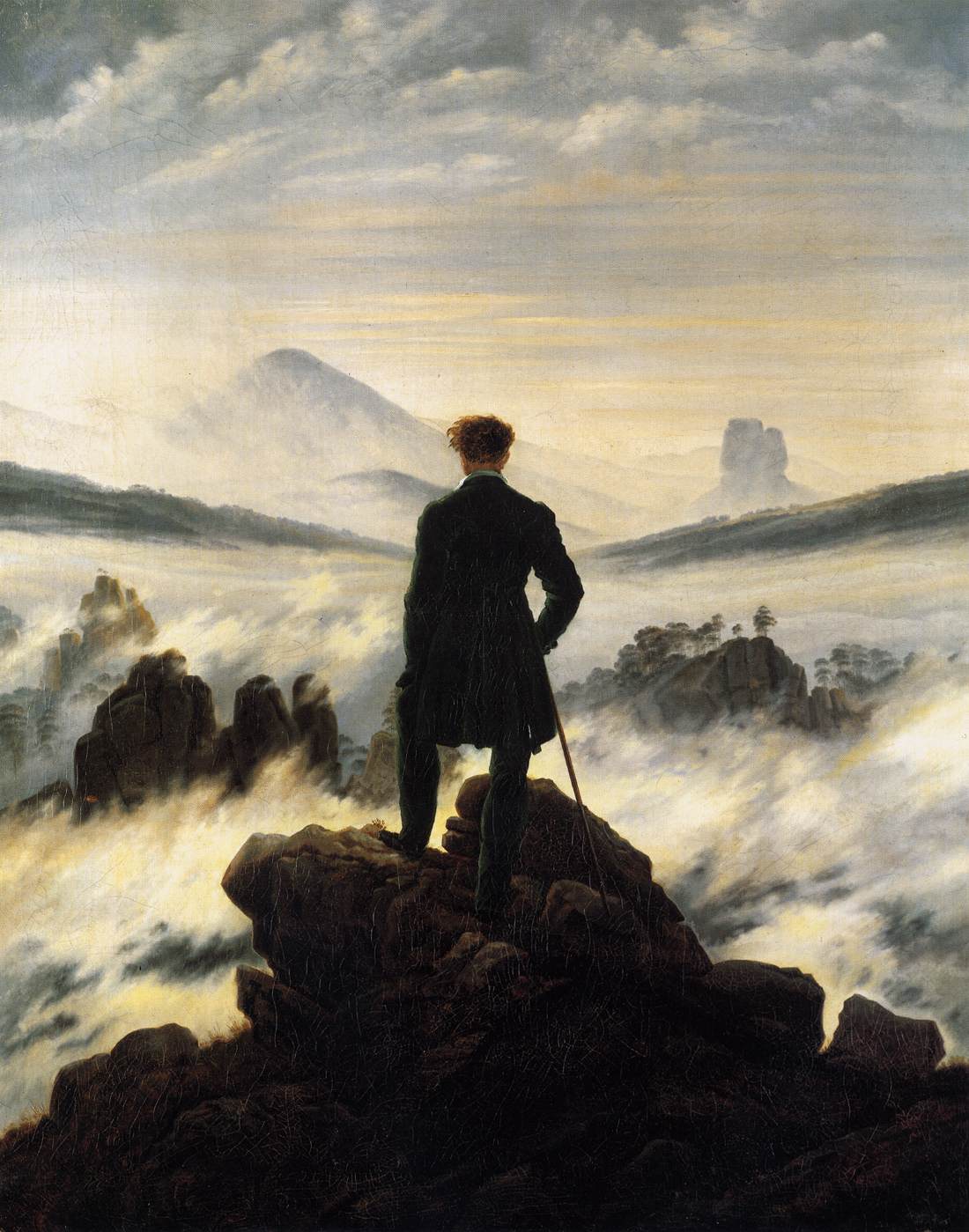
Caspar David Friedrich
As we move into the period we’ll be referring to as Romanticism, it is important to remember that when we discuss such terms, we should never consider them as fixed, self-contained concepts. Many of the Romantics probably never referred to themselves as such, and some often stood at the peripheries of this movement, never quite fully fitting in with whatever definition we might give to this movement as a whole. Likewise, there is also no fixed date at which to mark the beginning of Romanticism. We can trace it back to Rousseau, if we like, and iterations of Romantic impulses appear throughout the 18th century. The same goes for its ‘conclusion’; this ‘movement’ will trickle far into the 20th century. So as we move forward, think of Romanticism as a certain tendency, a general direction the wind is blowing in, or the barometric reading of the atmosphere of this time. This will loosen up our understanding of the term and allow us to flexibly move throughout the rest of this course and to better understanding subsequent, and often overlapping, movements.
As you’ll have read in the introduction, the Romantics are those poets and artists who looked elsewhere than the prevailing logic of order and reason, of scientific thought, on which an ‘enlightened’ society was constructing itself. This reached its height with the Reign of Terror in the early years of the French Revolution, but was also primarily linked to the Ancien Regime : the gardens at Versailles, the Encyclopedic project, the subsuming of the natural world to geometrical and scientific notation, etc. For the Ancien Regime, order imposed on a chaotic natural world was (and is) an expression of power.

It was against this equation of rational order and power that was found in both the Ancien Regime and the most violent period of the French Revolution, that the Romantics reacted against. Instead of an overly-rationalized society — which could only lead to Absolutism and/or the Guillotine — they concerned themselves more with the individual and his or her inner life (Rousseau is a great example of this inward-turn). They turned their efforts toward the expression of all that which we’ve seen cast out of a normative society: the spiritual, the otherworldly, the emotional and passionate life that one had to suppress, as for example in Ueda Akinari‘s Japan (though we are dealing with a different geographical location).
You’ll remember we’ve spent some time looking at Descartes‘s dualism, his mind-body distinction. His radical skepticism (doubting everything) led him to distrust his senses, as they could and often did deceive us, and gave us a distorted idea of what the world was. With this, the detached mind and its ability to rationalize became the privileged site of our interaction with and coming to understand the world. When a twig rests in a glass of water our senses tell us the twig is cut in two, with one half floating oddly on the surface. Our reason, however, tells us otherwise: the light entering the water refracts and therefore only gives us the illusion that the twig is cut in two. If we didn’t have this ability to rationalize, our world would constantly be deceiving us by way of our untrustworthy senses.

The dismissed body and its senses is what many of these poets and artists will try to recover, all the while allowing for certain experience and phenomena to remain unknown. Emotions, the inner dream-life, the fantastic and the inexplicable; the chaotic beauty of nature, primitive societies and their folktales and myths; all that which Reason tries to conquer or dismiss as irrational or unreasonable will find its way back in through these figures. This, however, is not meant simply in an aesthetic sense, but in a quest for a newly reconfigured and, hopefully, better society. One in which the individual and his or her society, as well as Nature, are reconciled and find themselves in a balanced relationship, and in which the principle of freedom, inherent in human nature, is upheld above all else.
You’ll remember that de Gouges returns to nature to make her argument about the arbitrary privileging of Male over Female, or Jean-Jacques Dessalines‘s blaming the cold, calculating reasoning within the far-off French cabinet when deciding to massacre Haitians; Burke, too, blames the economists, the scientists and the calculators for the industriously efficient execution of thousands of Parisians, which he correctly foresaw as the logical outcome of such a way of thinking.
This will be a common debate throughout the rest of the course; the negotiation between Rationality and Passion, the mind and the body; between Man and Nature, Man and Society.
